Fadli's blog
A Very Warm Welcome at the Conference Dinner
Wed, 09/21/2016 - 00:23 — Fadli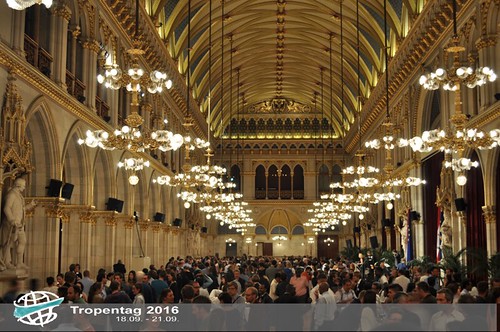
The second day of this year's conference just ended. It has been closed by the conference dinner at Vienna's historic City Hall: the perfect venue to feel the warm welcome from Tropentag. A traditional Viennese music ensemble, some delicious food, and an amazing location seem the be just a perfect combination to wrap up the intense day.

Indeed, I personally enjoyed when some participants took over the stage and performed their traditional dance. The others banqueters apparently had my same feeling as they clapped and joined the dance. Five people also got to receive the Ecoland Poster Award and a prize of 300 € each as the best Tropentag's posters. I hope you had a wonderful night too. But still, remember to spare some energy for the closing day tomorrow!
You can find more pictures of the dinner on our Flickr.Learning Crop Production Systems from Around the World
Tue, 09/20/2016 - 14:26 — FadliMany different cropping systems practices have been presented at today's Poster Session, and they come from all around the world. Directly from the University of Basel, for example, Schütz Lukas talked about the application of microbial inoculants as a promising science for sustainable agriculture. She found biofertiliser's use to be a viable technology to be applied in tropical and subtropical soil.
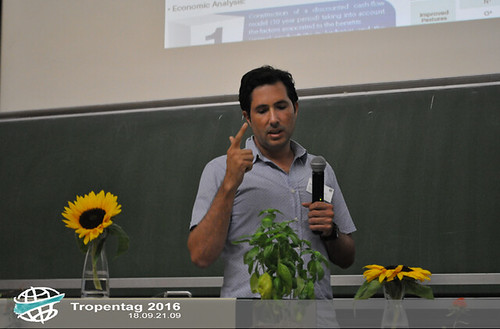
The benefits of bee-pollination on cash crop in Burkina Faso, then, was presented by Katharina Stein, from the University of Wuerzburg in Germany. “So far - she said - there is no report on contribution of bee pollination for crop yield of these crops in Burkina Faso”. In fact, her research shows well how bee-pollination can increase cotton fiber weight by 62% and can just triple the weight of sesame seeds. These numbers are a scientific proof that gratis pollination service by bees can be beneficial for small farmers and stakeholders. Too obvious to remind that natural savannah habitat in Burkina Faso would better be conserved?
Jury on The Josef G. Knoll European Science Award 2016 Winners
Tue, 09/20/2016 - 09:26 — FadliThe Josef G. Knoll European Science Award is given every two years to the authors of the best doctoral or post-doctoral theses. As a pioneer in agricultural research, it supports young researchers whose work focuses on improving the status of food and nutrition security in developing countries and makes a contribution to reducing hunger. The winners who have been awarded this year are three in total, and have very interesting profiles:
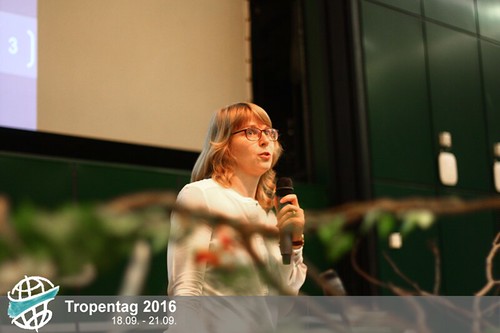
Dr. Sabine Liebenehm, from Leibniz University of Hannover, wrote a thesis on “New Insight from Behavioral Economics in Developing Countries”. “She produced an excellent work which is very important for small-scale farmers in developing country. It has direct implications regarding poverty and hunger,” announced the panel of judges.
Organic Farming Systems: from Kenya to Cuba
Tue, 09/20/2016 - 01:18 — FadliThe first session of guided posters presentation was held on Monday, 19th September. I personally got particularly interested in the organic farming systems topic. There are six intriguing poster presentations related to current studies on organic farming. The following are the overviews of the presentations:
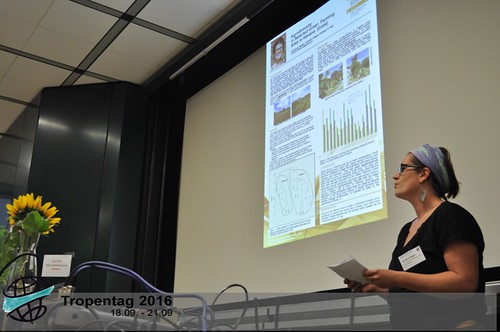
Christiane Ringler described agrobiodiversity in 15 urban gardening plots in Havanna, Cuba. She found 130 different plant species mostly as leafy vegetables, tubers, fruits and spices from 65 different families, and concluded that small urban farms might have higher species richness and evenness compared to larger gardens.
Bernhard Freyer, head of the Division of Organic Farming at BOKU and among the main organizers of Tropentag 2016, offered a stimulating lecture on growth and productivity of clover in the highlands of the Ethiopian Awi Zone. Different levels of organic treatment applied to clover, farmyard manure, fresh sesbania manure, and a combination of the two manures. As he explained, a high amount of organic manure as fertilizer has a strong impact on clover yield.
Check the Hans H. Ruthenberg Award for Graduates 2016 Here!
Mon, 09/19/2016 - 21:12 — FadliThis year independent scientific jury finished their assessment. Three winners with excellent research theses have been selected. Thirteen applicants submitted their theses this year. In order to be reckoned, the research should fulfil requirements such as academic excellence, scientific evidence, and it should address improvement in food security. However, for next year, the jury hopes that there will be more entries from international student. Take a look at the Hans H.Ruthenberg Award for Graduate 2016 winners and their excellent works.
Mareike Aufderheide-Voigts
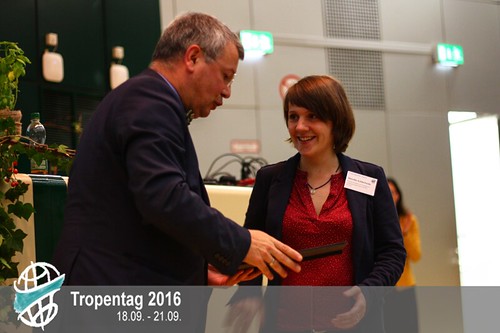
Mareike studied reproductive performance and modelled herd development of cattle kept. Borana pastoralists as dominating ethnic group in Sothern Eithiopia focus on keeping Boran cattle. During her field research, the student from Kassel-Witzenhausen University, found a different grazing system: families are split up between two grazing areas and the cattle are seasonally moved from one to the other section. In this sense, families practice an almost sedentary lifestyle, while the animals are still managed somehow as mobile. This usual procedure proved to improve food security in the region.
Grazing Game; Playful Way to Playing Climate Change
Mon, 09/19/2016 - 14:46 — FadliLearning of climate change now comes to a new method. Thanks to Grace Villamor and her team for Grazing Game. This game design as a tool to study the behavior of farmers is meant to respond to climate variability adaptation. Grazing Game comes in Board Game and Online Game. Villamor conducted trials in Benin and Ghana. “We do this also in order to avoid bias from farmers. Often, when we interview them, they tend to give exactly the answer we want to hear,” said the ZEF researcher. Participatory games like Grazing Game seem to be a solution against such bias.
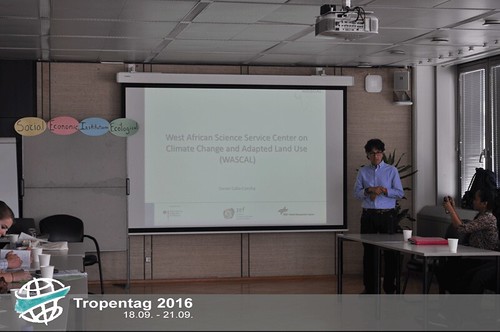
Ghana and Benin have been selected as trial countries because of their geographical location, at west Africa. And, as predicted, West Africa will have the most extreme climate change. Farmers, as actors, need to respond and take decisions on environmental conditions such us fluctuation of rainfall. Their response has reflected in the board game.
Men and Women Respond Differently





